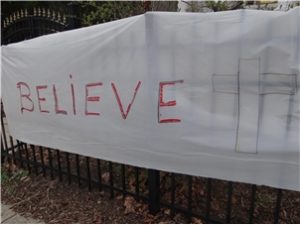Plague Journal, Believing Into A Void
 Today is Saturday. I awakened and checked the news feed on my iphone. According to the New York Times, by executive order the President has stopped all shipments to foreign customers, of masks which could be used at home to fight the Covid-19 virus. Never mind that the Germans, the Canadians have already paid for, and by common sense, own the ventilators, masks, etc. which are ready for shipment. Naturally they view the measure as piracy. This is the kind of hard-knuckle, realpolitik that leads to hostilities between nations.
Today is Saturday. I awakened and checked the news feed on my iphone. According to the New York Times, by executive order the President has stopped all shipments to foreign customers, of masks which could be used at home to fight the Covid-19 virus. Never mind that the Germans, the Canadians have already paid for, and by common sense, own the ventilators, masks, etc. which are ready for shipment. Naturally they view the measure as piracy. This is the kind of hard-knuckle, realpolitik that leads to hostilities between nations.
A thought came to my mind: What else would one expect from the administration that is nothing but self-centered, avaricious, improvident, doing nothing to prepare for a pandemic which they did not want to deal with?
This morning I received news that a good friend has the virus. She thinks that she has a mild case. Fortunately she is in her middle years and has no preexisting respiratory issues. She is a mother with a young child.
 I want to say more about the term “believe” which many have a fondness for. It is as if “belief,” belief in something, anything, — is better than belief in nothing. I am not sure about that.
I want to say more about the term “believe” which many have a fondness for. It is as if “belief,” belief in something, anything, — is better than belief in nothing. I am not sure about that.
Belief in itself is not a virtue. Enough of us think that “belief” is important, something that one does not want to be without. Among collections of polished earth tone pebbles, you will find “believe” engraved along with other words of pivotal meaning. (I have a brown pebble engraved with “Discover.”)
 There is no question that the giant annual rallies at Nuremberg intensified the “belief” of many German youth from 1933 to 1938. The belief thus cultivated was no different than the effect derived from the Trump campaign rallies, it seems to me. Ask yourself, on account of their belief, were/are these individuals better off than…? Seems to me their “beliefs” were superstitions of their respective times.
There is no question that the giant annual rallies at Nuremberg intensified the “belief” of many German youth from 1933 to 1938. The belief thus cultivated was no different than the effect derived from the Trump campaign rallies, it seems to me. Ask yourself, on account of their belief, were/are these individuals better off than…? Seems to me their “beliefs” were superstitions of their respective times.
The value of belief depends entirely upon the object, the language, the behaviors that are evoked…. Belief in a leader, or in a brand of nationalism that results in children taken from parents, and caged by ICE at our border with Mexico is … an amoral, dark faith.
Belief has a particularly volatile status in American society. There is a tradition among us raised in evangelical Christianity of placing an eminent value on “belief” rising from a passage in John’s Gospel chapter 3, verse 16. There is a cult-like reverence for this verse. It is a mantra. The idea is since Jesus is God’s favored son, by linking oneself (belief) with Jesus, you get to benefit from the divine patronage. Belief in Jesus=eternal life. Anyone familiar with how political patronage works easily understands the idea.
I hope that you are having a “what is wrong with this picture” moment. To my mind, something is quite wrong with that scenario.
In conclusion here are some words from an American philosopher whose writings have meant much to me in the past. Richard Rorty died in 2007.
Truth, — what comes to be believed in the course of free and open encounters. — Richard Rorty
The point here is that Truth, what is true, is the trump card, the highest value card in the hand that you and I are holding. “Belief” operates as a means to arriving at truth, our destination. Belief is a means only, and not a destination. Free and open encounter is essential, the sine qua non if you and I are to make a sound decision on what is worth believing.